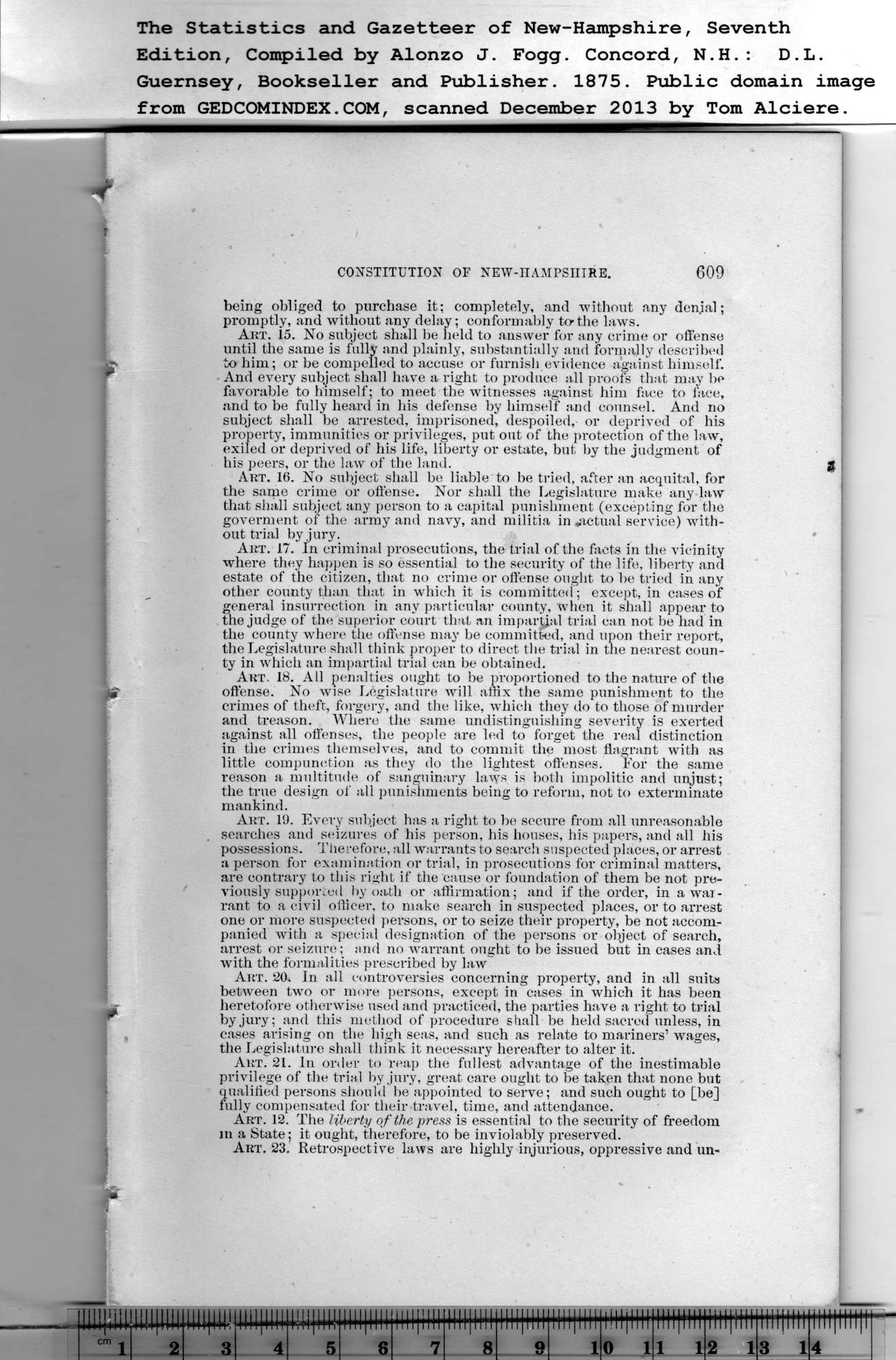|
CONSTITUTION OF NEW-HAMPSHIRE. 609
being obliged to purchase it; completely, and without any denial;
promptly, and without any delay; conformably to the laws.
Art. i5. No subject shall be held to answer for any crime or offense
until the same is fully and plainly, substantially and formally described
to him; or be compelled to accuse or furnish evidence against himself.
And every subject shall have a right to produce all proofs that may be
favorable to himself; to meet the witnesses against him face to lace,
and to be fully heard in his defense by himself and counsel. And no
subject shall be arrested, imprisoned, despoiled, or deprived of his
property, immunities or privileges, put out of the protection of the law,
exiled or deprived of his life, liberty or estate, but by the judgment of
his peers, or the law of the hind.
Art. 16. No subject shall be liable to be tried, after an acquital, for
the same crime or offense. Nor shall the Legislature make any law
that shall subject any person to a capital punishment (excepting for the
goverment of the army and navy, and militia in .actual service) with-
out trial by jury.
Art. 17. In criminal prosecutions, the trial of the facts in the vicinity
where they happen is so essential to the security of the life, liberty and
estate of the citizen, that no crime or offense ought to be tried in any
other county than that in which it is committed; except, in cases of
general insurrection in any particular county, when it shall appear to
the judge of the superior court that an impartial trial can not be had in
the county where the offense may be committed, and upon their report,
the Legislature shall think proper to direct the trial in the nearest coun-
ty in which an impartial trial can be obtained.
Art. 18. All penalties ought to be proportioned to the nature of the
offense. No wise Legislature will affix the same punishment to the
crimes of theft, forgery, and the like, which they do to those of murder
and treason. Where the same undistinguishing severity is exerted
against all offenses, the people are led to forget the real distinction
in the crimes themselves, and to commit the most flagrant with as
little compunction as they do the lightest offenses. For the same
reason a multitude of sanguinary laws is both impolitic and unjust;
the true design of all punishments being to reform, not to exterminate
mankind.
Art. 19. Every subject has a right to he secure from all unreasonable
searches and seizures of his person, his houses, his papers, and all his
possessions. Therefore, all warrants to search suspected places, or arrest
a person for examination or trial, in prosecutions for criminal matters,
are contrary to this right if the cause or foundation of them be not pre-
viously supported by oath or affirmation; and if the order, in a war-
rant to a civil officer, to make search in suspected places, or to arrest
one or more suspected persons, or to seize their property, be not accom-
panied with a special designation of the persons or object of search,
arrest or seizure; and no warrant ought'to be issued but in cases and
with the formalities prescribed by law
Art. 20. In all controversies concerning property, and in all suits
between two or more persons, except in cases in which it has been
heretofore otherwise used and practiced, the parties have a right to trial
by jury; and this method of procedure shall be held sacred unless, in
cases arising on the high seas, and such as relate to mariners’ wages,
the Legislature shall think it necessary hereafter to alter it.
Art. 21. In order to reap the fullest advantage of the inestimable
privilege of the trial by jury, great care ought to be taken that none but
qualified persons should be appointed to serve; and such ought to [be]
fully compensated for their travel, time, and attendance.
Art. 12. The liberty of the press is essential to the security of freedom
m a State; it ought, therefore, to be inviolably preserved.
Art. 23. Retrospective laws are highly injurious, oppressive and un-
PREVIOUS PAGE ... NEXT PAGE
This page was written in HTML using a program written in Python 3.2
|
